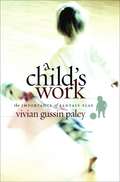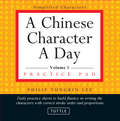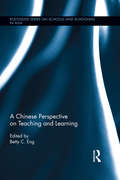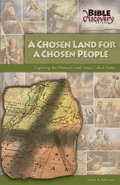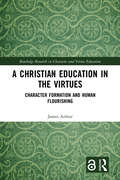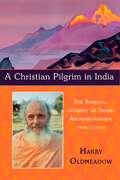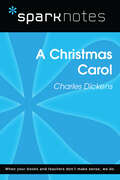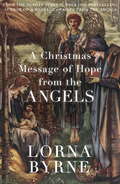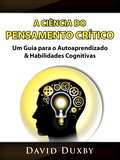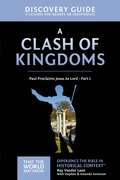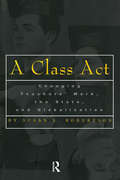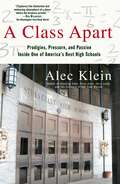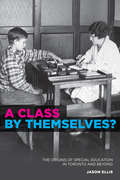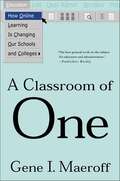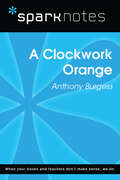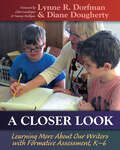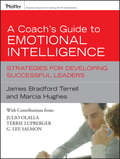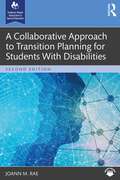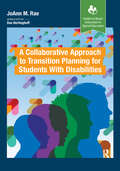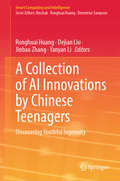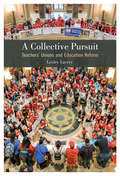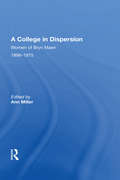- Table View
- List View
A Child's Work: The Importance of Fantasy Play
by Vivian Gussin PaleyThe buzz word in education today is accountability. In her new book, Vivian Gussin Paley decries this rapid disappearance of creative time and makes the case for the critical role of fantasy play in the psychological, intellectual, and social development of young children.
A Chinese Character A Day Volume 1: Simplified Character Edition
by Philip Yungkin LeeAlthough more people are studying the Chinese language than ever before, others are still wary of starting because they believe, "it's too difficult." But A Chinese Character A Day, Volume 1 will show beginner students that learning Mandarin Chinese characters is highly manageable when absorbed in small doses.<P><P> It will help intermediate and advanced Chinese learners review and improve upon their past studies and practice written Chinese every day. Chinese characters (hanzi) are fascinating pictographic symbols that each have a specific meaning. After a few weeks of gradual progress your ability to read Chinese, write Chinese and pronounce Chinese will grow tremendously. <P><P> This calendar like desk companion starts with the most basic Chinese characters and builds upon itself, one day at a time. For easy reference and review, a booklet listing the 365 Chinese characters is included.
A Chinese Perspective on Teaching and Learning (Routledge Series on Schools and Schooling in Asia)
by Betty C. EngBringing together educators from a range of backgrounds - psychology, sociology, social work, counseling, and teaching - this volume shows how Asian cultural values and beliefs can provide a lens through which to understand and envision how curriculum and pedagogy can be creatively adapted, not only in a local Chinese classroom context, but in a global context as well.
A Chosen Land: Exploring the Promised Land Jesus Called Home (Bible Discovery Series)
by James A AdermanWho were God’s chosen people?God chose the Israelites for a great purpose: it was from their people that the Savior, Jesus, would be born. To accomplish that purpose, God planted his chosen people in a particular area and cared for them over countless generations.In A Chosen Land for a Chosen People, you’ll learn about the climate of the Promised Land, the blessings and challenges it brought to the Israelites, and why God’s Son was born there of all places in the world. As you discover more about the land where Jesus lived, you’ll better understand God’s grand plan of salvation and the grace that saves you as well.This book is part of the Bible Discovery Series, which provides you with background resources to help you unearth and understand the Bible’s greater meaning for your life today!
A Christian Education in the Virtues: Character Formation and Human Flourishing (Routledge Research in Character and Virtue Education)
by James ArthurA Christian Education in the Virtues examines the connection between human nature and human flourishing. It draws on ancient and medieval sources to explore the formation of the person based on a Christian anthropology, emphasising the communal nature of the virtuous life and provides a richer approach to the question of contemporary character education. The book argues that the only way to understand and construct our character virtues is to have a clear picture of what is the purpose and meaning of human life. It highlights the importance of engaging with moral issues and makes the case that, for Christian educators, human flourishing is inseparable from God’s active relationship to human beings. The book also explores a teleological approach to character education goals. To educate the whole person in the light of an all-embracing Christian worldview is challenged by secular and liberal ideology and is often seen as irrational to the modern mind. Overall, the text seeks to demonstrate that many aspects of a Neo-Aristotelian-Thomist theoretical underpinning for Christian character education holds out a viable option for Christians. It therefore argues the case for the educational potential of Christian character education. This important book will be essential reading for academics, researchers and students in the fields of character and virtue education, religious education and the philosophy of education.
A Christian Pilgrim in India: The Spiritual Journey of Swami Abhishiktananda (Henri Le Saux)
by Harry OldmeadowThis book provides a biographical account of the remarkable Benedictine monk, Henri Le Saux (1910-1973), who spent the last two-and-a-half decades of his life in India where he immersed himself in Hindu spirituality. It traces the central themes of his prolific writings on religious and mystical topics.
A Christmas Carol (SparkNotes Literature Guide Series)
by SparkNotesA Christmas Carol (SparkNotes Literature Guide) by Charles Dickens Making the reading experience fun! Created by Harvard students for students everywhere, SparkNotes is a new breed of study guide: smarter, better, faster.Geared to what today's students need to know, SparkNotes provides:chapter-by-chapter analysis explanations of key themes, motifs, and symbols a review quiz and essay topics Lively and accessible, these guides are perfect for late-night studying and writing papers.
A Christmas Message of Hope from the Angels: A Short eBook Collection of Inspirational Writing for the Festive Period
by Lorna ByrneFrom the Sunday Times number one bestselling author Lorna Byrne.In this short ebook Lorna, who sees angels with as much clarity as the rest of us see people, tells of the special angels she sees at Christmas. She movingly describes the Christmas angels she has seen since she was a child, dropping balls of light onto each and every home, helping us to reconnect with our memories of Heaven. Lorna tells of the blessing angels who she sees walking down from the sky at this time of the year, moving in a way that no other angel does, and reaching out to touch each one of us. This book will awaken the Christmas spirit within all of us with its message that Christmas is about much more than material things - that Christmas is above all at time for kindness and love. THIS CHRISTMAS THEMED BOOK CONTAINS:*The special Christmas Message of Hope chapter from Lorna Byrne's number one bestselling A Message of Hope from the Angels*A Christmas prayer*An interview with Lorna Byrne
A Christmas Message of Hope from the Angels: A short ebook collection of inspirational writing for the festive period
by Lorna ByrneFrom the Sunday Times number one bestselling author Lorna Byrne.In this short ebook Lorna, who sees angels with as much clarity as the rest of us see people, tells of the special angels she sees at Christmas. She movingly describes the Christmas angels she has seen since she was a child, dropping balls of light onto each and every home, helping us to reconnect with our memories of Heaven. Lorna tells of the blessing angels who she sees walking down from the sky at this time of the year, moving in a way that no other angel does, and reaching out to touch each one of us. This book will awaken the Christmas spirit within all of us with its message that Christmas is about much more than material things - that Christmas is above all at time for kindness and love. THIS CHRISTMAS THEMED BOOK CONTAINS:*The special Christmas Message of Hope chapter from Lorna Byrne's number one bestselling A Message of Hope from the Angels*A Christmas prayer*An interview with Lorna Byrne
A Ciência do Pensamento Crítico: Um Guia para o Autoaprendizado & Habilidades Cognitivas
by David DuxbyVocê gostaria de ser capaz de pensar criticamente e com clareza? As técnicas de pensamento crítico já vêm sendo utilizadas há muito tempo para tomar decisões melhores em todos os aspectos da vida, literalmente! Ao usar as técnicas de pensamento crítico, será mais fácil planejar seu orçamento, aumentar sua renda, viver bem, ter uma alimentação mais saudável, tomar melhores decisões, ter mais disposição, foco e satisfação de maneira geral e muito mais! Desenvolva suas habilidades de pensamento crítico e cultive emoções mais positivas e mais qualidade de vida. Este guia apresenta os segredos dos profissionais mais eficientes e como eles usam o pensamento crítico! Após décadas de estratégias testadas, este e-book trará a você a maneira mais rápida e eficiente de usar o pensamento crítico para o seu benefício e bem-estar! Você aprenderá técnicas comprovadas sem precisar investir em cursos caros ou outros materiais complementares. O que você encontrará neste guia: - Tome melhores decisões. - Tenha relações mais saudáveis. - Ganhe mais dinheiro. - Tenha mais energia. - Alimente-se melhor. - Reduza e elimine a ansiedade. - Tenha um sono de melhor qualidade. - Aprenda a lidar com desafios e obstáculos com maior facilidade. E muito mais! Se você quer se tornar mais saudável ou melhorar o seu foco e o seu bem-estar, então este guia é para você.
A Clash of Kingdoms Discovery Guide: Paul Proclaims Jesus As Lord – Part 1 (That the World May Know #15)
by Ray Vander LaanHow do we as Christians proclaim God's name in all the earth in the midst of false gospels?Learn from the Apostle Paul as he communicated the Good News of Christ to Philippi, a Roman colony that worshipped false gods. In this fifteenth volume of the That The World May Know series, take a tour through the land of the Bible and discover how to live in your present-day Philippi or Delphi—a dechristianized Western world—in a way that keeps your citizenship in God's Kingdom.This discovery guide includes passages of Scripture explored in the DVD (sold separately); questions for discussion and personal reflection; personal Bible studies to help you deepen your learning experience between sessions; as well as sidebars, maps, photos, and other study tools.The Gospel of CaesarThe BelieversThe Powers of DarknessThe Philippian JailerConfronting the EmpireDesigned for use with A Clash of Kingdoms Video Study (sold separately)._______________THAT THE WORLD MAY KNOWJoin renowned teacher and historian Ray Vander Laan as he guides you through the land of the Bible. In each lesson, Vander Laan illuminates the historical, geographical, and cultural context of the sacred Scriptures.Filmed on location in the Middle East and elsewhere, the That the World May Know film series will transform your understanding of God and challenge you to be a true follower of Jesus.
A Class Act: Changing Teachers Work, the State, and Globalisation (Studies in Education/Politics)
by Susan RobertsonThis book offers an original and challenging theoretical and empirical approach to mapping the changing nature of teachers' work historically and in the contemporary period. It is an attempt to understand how and in what ways teachers' work has changed following the demise of the post-war settlement and the imminent collapse of teachers' project of professionalism secured through solidaristic strategies such as unionism. Dr. Robertson argues that in order to understand these issues, a more rigorous set of conceptual tools around social class, occupational power and worker control is needed. The first two sections of the book set out to address that problem. The final section elaborates on the changing contexts and conditions for contemporary teachers more generally, and argues that structural and ideological changes within educational provision have led to differing capacities in the realization of class assets.
A Class Apart: Prodigies, Pressure, and Passion Inside One of America's Best High Schools
by Alec KleinEnter Stuyvesant High, one of the most extraordinary schools in America, a place where the brainiacs prevail and jocks are embarrassed to admit they play on the woeful football team. Academic competition is so intense that students say they can have only two of these three things: good grades, a social life, or sleep. About one in four Stuyvesant students gains admission to the Ivy League. And the school's alumni include several Nobel laureates, Academy Award winners, and luminaries in the arts, business, and public service. A Class Apart follows the lives of Stuyvesant's remarkable students, such as Romeo, the football team captain who teaches himself calculus and strives to make it into Harvard; Jane, a world-weary poet at seventeen, battling the demon of drug addiction; Milo, a ten-year-old prodigy trying to fit in among high-school students who are literally twice his size; Mariya, a first-generation American beginning to resist parental pressure for ever-higher grades so that she can enjoy her sophomore year. And then there is the faculty, such as math chairman Mr. Jaye, who is determined not to let bureaucratic red tape stop him from helping his teachers. He even finds a job for a depressed math genius who lacks a college degree but possesses the gift of teaching. This is the story of the American dream, a New York City school that inspires immigrants to come to these shores so that their children can attend Stuyvesant in the first step to a better life. It's also the controversial story of elitism in education. Stuyvesant is a public school, but children must pass a rigorous entrance exam to get in. Only about 3 percent do so, which, Stuyvesant students and faculty point out, makes admission to their high school tougher than to Harvard. On the eve of the hundredth anniversary of Stuyvesant's first graduating class, reporter Alec Klein, an alumnus, was given unfettered access to the school and the students and faculty who inhabit it. What emerges is a book filled with stunning, raw, and heartrending personalities, whose stories are hilarious, sad, and powerfully moving.
A Class Trip with Miss Royal (Primary Phonics Storybook #Set 6 Book 5)
by Joan Fleiss Kaplan"These appealing decodable stories nurture early literacy development, which translates into building new readers' self-confidence. This, in turn, quickens the pace at which genuine reading comprehension is achieved ..."--Epsbooks.com.
A Class by Themselves?: The Origins of Special Education in Toronto and Beyond
by Jason EllisIn A Class by Themselves?, Jason Ellis provides an erudite and balanced history of special needs education, an early twentieth century educational innovation that continues to polarize school communities across Canada, the United States, and beyond. Ellis situates the evolution of this educational innovation in its proper historical context to explore the rise of intelligence testing, the decline of child labour and rise of vocational guidance, emerging trends in mental hygiene and child psychology, and the implementation of a new progressive curriculum. At the core of this study are the students. This book is the first to draw deeply on rich archival sources, including 1000 pupil records of young people with learning difficulties, who attended public schools between 1918 and 1945. Ellis uses these records to retell individual stories that illuminate how disability filtered down through the school system’s many nooks and crannies to mark disabled students as different from (and often inferior to) other school children. A Class by Themselves? sheds new light on these and other issues by bringing special education’s curious past to bear on its constantly contested present.
A Classroom of One: How Online Learning Is Changing our Schools and Colleges
by Gene I. MaeroffA Classroom of One is Gene Maeroff's "report from the front" on the short history and status of online learning in the United States and around the world. Maeroff is a reporter who takes you to the schools from Penn State's World Campus to the Florida Virtual School to the newly emerging online learning initiatives in Afghanistan. His journey ultimately provides a snapshot of the way in which technology is changing the minds of people with regard to the nature of higher education. He looks at the method of electronic delivery, the quality of the information being delivered and quality of interaction it engenders. He looks at the way learners are adapting to this new technology and how much responsibility is put on the student's shoulders. Finally, and maybe tellingly, he looks at the business of online learning.
A Clear and Present Word: The Clarity of Scripture (New Studies in Biblical Theology #Volume 21)
by Mark D. ThompsonA lack of confidence in the clarity or perspicuity of Scripture is apparent in Western Christianity. In this New Studies in Biblical Theology volume, Mark Thompson restates the doctrine of the clarity of Scripture. He surveys past and present objections, engages with contemporary hermeneutical challenges, and expounds the living God as the Guarantor of his accessible, written Word.
A Clockwork Orange (SparkNotes Literature Guide Series)
by SparkNotesA Clockwork Orange (SparkNotes Literature Guide) by Anthony Burgess Making the reading experience fun! Created by Harvard students for students everywhere, SparkNotes is a new breed of study guide: smarter, better, faster.Geared to what today's students need to know, SparkNotes provides:chapter-by-chapter analysis explanations of key themes, motifs, and symbols a review quiz and essay topics Lively and accessible, these guides are perfect for late-night studying and writing papers.
A Closer Look: Learning More About Our Writers with Formative Assessment
by Lynne Dorfman Diane DoughertyIn A Closer Look, Lynne Dorfman and Diane Dougherty provide the tools and strategies you need to use formative assessment in writing workshop. Through Lynne and Diane's ideas, you will be able to' establish an environment where students will internalize ways that they can assess their own writing and become independent writers. Lynne and Diane share methods for collecting and managing information, and show practical, simple, and concise ways to document student thinking. In the accompanying online videos, they demonstrate conferences with individual writers, small groups, and whole groups. Quick, easy-to-manage assessment methods emphasize that formative assessment does not have to take a long time to be worthwhile and effective. Vignettes from classroom teachers, principals, and authors add a variety of perspectives and classroom experiences on this important topic. A Closer Look shows that when students are in charge of their own writing process and set and reach their own goals, writing becomes a vibrant, energetic part of the day. '
A Coach's Guide to Emotional Intelligence
by James Bradford Terrell Marcia HughesA Coach?s Guide to Emotional Intelligence is a groundbreaking book that combines the topics of coaching and emotional intelligence in a down-to-earth resource for coaches, facilitators, and consultants. The authors, James Bradford Terrell and Marcia Hughes ?two experts in the field of emotional intelligence training?offer a number of elegant solutions that help coaches and their clients develop the authentic emotional skills needed to meet the challenges of today?s increasingly complex world. The book clearly shows how EI coaching can be applied within organizations and provides a solid coaching method for use with leaders in business settings. The book outlines five highly-effective strategies for developing influential leaders.
A Collaborative Approach to Transition Planning for Students With Disabilities (Evidence-Based Instruction in Special Education)
by JoAnn M. RaeThe book’s framework is specially designed to advance students’ involvement and participation in their lives, not only in the presence of the most severe sensory and intellectual disabilities, but also in the case of multiple disabilities. Unique scenarios not typically seen in other textbooks, such as IEP team disagreements, students with terminal illnesses, students with ill or overworked parents, or students living in poverty are also explored.This updated edition also includes: Descriptions of research-based practices to maximize students’ self-determination, autonomy, goal setting, and ability to have successful life experiences Opportunities to integrate knowledge with practice by providing strategies that relate to the real-life difficulties students and transition planning specialists may encounter Easy-to-replicate communication tools, such as letters to students and parents, as examples to enhance collaboration Methods for teachers to effectively promote and increase student involvement and collaboration by using structured and interactive interviews Guidance aligned with the most up-to-date special education law A Collaborative Approach to Transition Planning for Students with Disabilities reflects the universal challenges that teachers, families, and finally, the students themselves face, as they progress through school with a disability. For students with disabilities, the key component to successful transition planning is creating a collaborative atmosphere that allows them to be successful. This book promises to serve as an essential resource to all who are dedicated to that goal.
A Collaborative Approach to Transition Planning for Students with Disabilities (Evidence-Based Instruction in Special Education)
by JoAnn M. RaeA Collaborative Approach to Transition Planning for Students with Disabilities is designed to inform aspiring special education teachers, special education teams, transition planning specialists and school administrators about the complex process of transition planning and to meet the transition requirements of special education legislation. Author Dr. JoAnn Rae has been in the field of special education for 34 years, in service as a special education teacher, special education administrator, teacher certification supervisor and as college faculty. The framework she outlines is specially designed to advance students’ involvement and participation in their lives, not only in the presence of the most severe sensory and intellectual disabilities, but also in the case of multiple disabilities. Unique scenarios not typically seen in other textbooks, such as IEP team disagreements, students with terminal illnesses, students with ill or overworked parents or students living in poverty are also explored. The text also includes: Descriptions of research-based practices to maximize students’ self-determination, autonomy, goal setting and ability to have successful life experiences Opportunities to integrate knowledge with practice by providing strategies that relate to the real-life difficulties students and transition planning specialists may encounter Easy-to-replicate communication tools, such as letters to students and parents, as examples to enhance collaboration Methods for teachers to effectively promote and increase student involvement and collaboration by using structured and interactive interviews A Collaborative Approach to Transition Planning for Students with Disabilities reflects the universal challenges that teachers, families and finally, the students themselves face, as they progress through school with a disability. For students with disabilities, the key component to successful transition planning is creating a collaborative atmosphere that allows them to be successful. This book promises to serve as an essential resource to all who are dedicated to that goal.
A Collection of AI Innovations by Chinese Teenagers: Discovering Youthful Ingenuity (Smart Computing and Intelligence)
by Yanyan Li Ronghuai Huang Jinbao Zhang Dejian LiuThis book presents 10 artificial intelligence (AI) innovation projects by Chinese teenagers, including innovations on intelligent medical care, environmental protection, education, transportation, among others. It delves into the technical details of these innovations, providing readers with a comprehensive understanding of the concepts and technologies involved in each case. The book also discusses the challenges faced by young innovators and their approaches to overcome them, and serves as a valuable resource for readers interested in the practical applications of AI.
A Collective Pursuit: Teachers' Unions and Education Reform
by Lesley LaveryTeachers’ unions are the organizations responsible for safeguarding the conditions of teachers’ employment. Union supporters claim strong synergies between teachers’ interests and students’ interests, but critics of unions insist that the stance of teachers in collective bargaining may disadvantage students as unions reduce the power of administrators to manage, remove, reward or retain excellent teachers. In A Collective Pursuit, Lesley Laveryunpacks how teachers’ unions today are fighting for contracts that allow them to earn a decent living and build “schools all students deserve.” She explains the form and function of the nation’s largest teachers’ unions. Lavery then explores unionization campaigns in the Twin Cities charter schools. A Collective Pursuit also examines teacher strikes and contract negotiations, school finance and finance reform, and district and union attempts to address racial achievement gaps, to provide a context for understanding the economic, political, and demographic forces that inspire teachers to improve conditions for students. A Collective Pursuit emphasizes that while teachers’ unions serve a traditional, economic role, they also provide a vast array of valuable services to students, educators, parents, and community members.
A College In Dispersion: Women of Bryn Mawr 1896-1975
by Ann MillerThis report, examining the lives of the women of Bryn Mawr, is designed to make the results of the 1970–1971 Bryn Mawr College Alumnae Survey accessible for general use. The survey reveals that there is a geographical clustering of graduates in the Eastern seaboard shelf.
